John Salley Brings His "A" Game and it Involves Kittens!
John Salley, Meow Madness
 The incredibly talented and charismatic John Salley was the first NBA player to win four championships with three different franchises, Detroit, Miami and the LA Lakers. But did you know he's also a Vegan and has an affinity for kittens? He'll be co-hosting Hallmark Channel's 'Meow Madness' Kitten Basketball Championship. John is our special guest this week. Find out what it's like to be a top athlete and abstain from all meat and dairy.
The incredibly talented and charismatic John Salley was the first NBA player to win four championships with three different franchises, Detroit, Miami and the LA Lakers. But did you know he's also a Vegan and has an affinity for kittens? He'll be co-hosting Hallmark Channel's 'Meow Madness' Kitten Basketball Championship. John is our special guest this week. Find out what it's like to be a top athlete and abstain from all meat and dairy.
John tells us he has has been a vegetarian since 1991 and became a vegan in 2008. He tells us that a vegetarian is only supposed to eat vegetables, which he calls a "lying" vegetarian. He states if you drink milk or have eggs and cheese, he calls it "liquid meat." John states that he now doesn't eat anything that comes from an animal.
When asked how can someone be as large and strong as he is without eating meat, he laughs, and says he looks at the size of a cow and they don't eat meat; he looks at the size of a gorilla and they don't eat meat; he also looks at the size of a hippopotamus and the size of a giraffe. He also says everyone wants to be as strong as the oxen, but they forget that the oxen eat grass.
Currently John doesn't have any animals, as his dog recently passed away. However, he does feed the stray cats around his house or the raccoons, if they beat the cats to the food! So does he food these animals meat? John laughs and tells us about V-dog, a plant based vegan dog food. He also grinds up a lot of compost. These stray cats are hungry, so they have no problem with eating it.
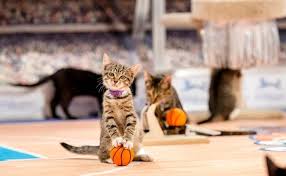 John will be the co-announcer of the first ever "Meow Madness' Kitten Basketball Championship on the Hallmark Channel along with Peabody Award-winning sportscaster Mary Carillo, giving you a chance to win $10,000.
John will be the co-announcer of the first ever "Meow Madness' Kitten Basketball Championship on the Hallmark Channel along with Peabody Award-winning sportscaster Mary Carillo, giving you a chance to win $10,000.
Every spring, America thrills to the Men's college basketball championship, but as exciting as the action is, there has always been something missing. And we can all agree that something is kittens! This minor oversight finally gets rectified on Monday, April 3 (8 p.m. ET/PT) when, for the first time, the country will thrill to cat-letes from all paws of life playing in the inaugural kitten basketball championship, "Meow Madness."
However, no basketball competition (human or kitten) is complete without a bracketological system for determining winners. The Hallmark Channel has created its very own customized brackets which pair a kitten basketball star to one of 64 Hallmark Original Christmas movie titles.
John said he announced the show as if it were a game involving UCLA. He said it was the most fun you ever want to see and will literally make you laugh! All of the kittens play on their own will and are not forced to do anything.
Hallmark Channel is bringing cats, college basketball, Christmas and original films under a single banner all in the name of helping adorable kittens get adopted. So far over, 1,000 kittens and cats have been adopted!
Visit Website
Just How Well Can Your Cat Smell?
Dr. Marty Becker, America's Veterinarian
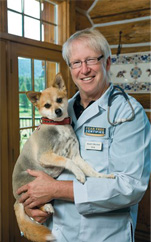 Dr. Marty Becker is doing research on smells your cat likes. It's all in the name of science. He wants your pet's environment to be "Fear Free." While we all know about Catnip, did you know Silver-vine and Honeysuckle will also appeal to your feline friends? But stay away from the Glade and Aroma Plug-ins. They could really annoy your pet...even make them sick.
Dr. Marty Becker is doing research on smells your cat likes. It's all in the name of science. He wants your pet's environment to be "Fear Free." While we all know about Catnip, did you know Silver-vine and Honeysuckle will also appeal to your feline friends? But stay away from the Glade and Aroma Plug-ins. They could really annoy your pet...even make them sick.
A cat's sense of smell seems so basic. However, Dr. Becker states there are some new fascinating studies that talk about cats getting euphoric when they were looking at olfactory enrichment for felines.
Mikkel Delgado and Tony Buffington, who are feline gurus, were looking at what you can do for enrichment activities with cats. What they found was that about two thirds of cats responded to catnip, but three fourths of the cats responded to silver vine and about fifty-percent responded to a certain type of honeysuckle. Silver vine is a plant, so it is not in the catnip family. The best place, and the best plant, actually comes from Japan.
It's interesting in cats because they do a great big inhale, causing the scent to blow up their nostrils into their vomeronasal organ, which is in the roofs of their mouths. This organ is like a turbo charger for scent and also allows them to smell pheromones. These pheromones convey information between individuals of the same species.
 This means that you cat can smell things that you can't, and if you can smell something, it is a lot stronger for your cat.
This means that you cat can smell things that you can't, and if you can smell something, it is a lot stronger for your cat.
Dr. Becker warns against using things like scented glade plug-ins. Cats don't like them and it can cause them stress. Instead, use things like silver vine and honeysuckle. You can place them in a clean sock and the scatter them around the house causing your cat can track them. This makes them feel like they are hunting.
If you're looking for treats that cats really like, try Bonita fish flakes, whip cream, marshmallows, anchovy paste, vegemite, among other things, as well as green olives. If you place a green olive in front of about 20-percent of cats, they will pounce on it like it is a mouse and chew on it. Not only is it great amusement for you to watch, it is also fun for your cat.
Just remember the heavy fragrances we use, whether it is on our bodies, the powder carpet cleaner that we spread around, or even plugs-ins, we need to be very careful and aware of our cat's environment.
Visit Website
5 Dangerous Pet Poisons Found In Most Homes
Robert Semrow, Listomania
 Dangerous pet poisons can be found in any home on a daily basis. We here at Animal Radio try to share knowledge and care whenever we can. So, take a minute or three to identify if these items are in your home and if they are out of the reach of your beloved pets. If not, take some time today and get them put away safely.
Dangerous pet poisons can be found in any home on a daily basis. We here at Animal Radio try to share knowledge and care whenever we can. So, take a minute or three to identify if these items are in your home and if they are out of the reach of your beloved pets. If not, take some time today and get them put away safely.
Ready household pet poison detectives? Let's identify a few of these common dangers that can harm both dogs and cats.
Let's start with human and pet medications. Every year there are numerous horror stories about pets, dogs, cats, ferrets and other quick and curious pets getting in to serious health situations by ingesting human and pet medications not meant for them. It should go without saying, but keep any and all medications out of the reach of your two legged and four legged children.
 Next up - Household Cleaners. Just because it says all natural or green does not mean it is safe for your pets. If you are looking at the label for guidance, then you need to make sure it says "Pet Safe." There is a big difference between natural and environmentally safe and being pet safe. Your dogs and cats, if they encounter the areas that you are cleaning, can get the chemicals on their feet or other parts and when self-grooming they can ingest these chemicals, which can severely harm them.
Next up - Household Cleaners. Just because it says all natural or green does not mean it is safe for your pets. If you are looking at the label for guidance, then you need to make sure it says "Pet Safe." There is a big difference between natural and environmentally safe and being pet safe. Your dogs and cats, if they encounter the areas that you are cleaning, can get the chemicals on their feet or other parts and when self-grooming they can ingest these chemicals, which can severely harm them.
Rodenticides and Pesticides - Again, your dogs and cats can be overcome by curiosity, especially after a rat or mouse has nibbled on the poison from one of these and it can lead to accidental poisoning of your pet. Be very vigilant of the traps and at least in the case of dogs, try to place them where a dog can't reach. Again, sprays and chemicals that may be used should state that they are pet safe or they shouldn't be used around your pets. Also, watch to make sure that these chemicals aren't finding their ways into areas that your pet likes to visit and recreate in.
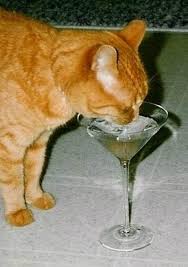 One more very common pet poison potential is from foods and alcohol that we enjoy and they can get access. Alcohol is universally dangerous for our pets. Make sure you are not leaving this out where your pets can reach it. They do not know what it is and the unique smells may make it all that much more enticing to them. The same holds true for foods, things like onions, candy, gum, grapes and raisins can have severe consequences for your pets, so make sure that after you've enjoyed them, there aren't any left-overs where your curious pet can get into them.
One more very common pet poison potential is from foods and alcohol that we enjoy and they can get access. Alcohol is universally dangerous for our pets. Make sure you are not leaving this out where your pets can reach it. They do not know what it is and the unique smells may make it all that much more enticing to them. The same holds true for foods, things like onions, candy, gum, grapes and raisins can have severe consequences for your pets, so make sure that after you've enjoyed them, there aren't any left-overs where your curious pet can get into them.
Remember our pets trust us implicitly and they are prone to want to explore our worlds and what we are doing. So if you are eating or drinking it, they assume they can to. Until we develop a pet poison warning system that pets can understand, it's our responsibility to remove and reduce the household risks to our pets.
Share your ideas on how to remove and reduce household pet poison risks on our Animal Radio Face Book Page.
Share your Pet Sitter tips with us here at Animal Radio on our Animal Radio Facebook Page.
Visit Website
Pet Flipping - SevenTips to Safeguard Your Pet - Dr. Debbie
 Pet lovers beware of the disturbing criminal trend called "pet flipping." This is when a person steals a pet or takes ownership of a lost pet, and then sells the animal. Pets are typically sold on the Internet to make a quick profit. The American Kennel Club (AKC) reports a rise in pet thefts.
Pet lovers beware of the disturbing criminal trend called "pet flipping." This is when a person steals a pet or takes ownership of a lost pet, and then sells the animal. Pets are typically sold on the Internet to make a quick profit. The American Kennel Club (AKC) reports a rise in pet thefts.
Pet flippers most commonly target purebred dogs because they can fetch a high price, but even mixed breed dogs are at risk. Dogs are swiped from porches, fenced in back yards, dog parks, and cars. Some pet scams involve a person advertising as a pet sitter or trainer, who then disappears with your pet. Other scams involve someone who steals a pet and then responds to the lost pet ad, making money on rewards.
Top 7 Tips to Prevent Pet Flipping:
1. Don't Leave Your Pet Unattended
Avoid leaving your pet unattended, even in your own backyard. Don't leave your pet outside of stores or coffee shops. Tying your dog's leash up while you run that quick errand can give a thief the few minutes he needs to snatch your pet while you step away. Keep a watchful eye on your dog when visiting dog parks.
2. Get Your Pet Microchipped
A microchip is one of the best tools to reunite lost pets and serves as legal proof of ownership. Be sure to keep your contact information up to date with the microchip company.
 3. Use GPS Collars
3. Use GPS Collars
A GPS collar allows you to track your dog's movement minute by minute. These units can help you find your pet quickly if lost, but are of little use if a pet flipper removes the collar. I use the Tagg Pet Tracker for my dog and like that I can locate him to a precise location with my smart phone.
4. Get Your Pet Spayed or Neutered
Dogs that aren't spayed or neutered are especially prized targets to thieves since they are perceived as a money-making opportunity. Spaying and neutering also decreases the desire to stray and is good for your pet's health.
5. Research Pet Services Carefully
Before signing on for pet sitting or dog trainer services, research the business person's reputation with the Better Business Bureau. Ask your veterinarian for a referral to a reputable pet professional. Request references before using a new pet service.
6. Buyer Beware
Be cautious when buying a pet online and only use reputable breeders. Check out a breeders standing with the AKC and breed clubs. Be wary of individuals that lack documentation of breeding or veterinary health care records.
7. Sign Up For Doggie Facial Recognition Apps
High-tech facial recognition technology is now available to identify and track down lost pets with services like Finding Rover. Use your IPhone to download the app at http://findingrover.com. Upload your pet's photo in their database, and promptly notify Finding Rover if your pet is ever lost.
Pet flipping is so heinous because it exploits the cherished relationship between family and a beloved pet. Share this information with fellow pet lovers to spread awareness and halt this criminal trend.
Featured veterinarian known as "Dr. Debbie" on national pet radio program, Animal Radio. Ebook author of "Yorkshire Terriers: How to Be Your Dog's Best Friend"; "Pugs: How to Be Your Dog's Best Friend"; "Mini Schnauzers: How to Be Your Dog's Best Friend"; and "Shih Tzu: How to Be Your Dog's Best Friend."
Visit Website
Animal Radio News - Lori Brooks
 Animal Abusers Barred From Owning Pets in RI
Animal Abusers Barred From Owning Pets in RI
People convicted of abusing animals would be barred from owning a new pet in Rhode Island under a new law being considered in the state's General Assembly. It would create a statewide registry of animal abusers barring animal shelters, pet stores and breeders from allowing the sale or adoption of an animal to someone listed on the registry. Under the proposal, anyone convicted or pleading no contest to animal abuse would have to register and abusers who fail to register, or who are caught owning another pet, would be subject to up to one year in prison plus a $1,000 fine.
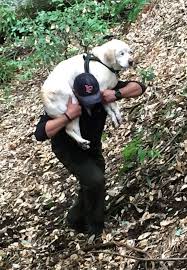 Firefighter Finds Lost Blind Dog
Firefighter Finds Lost Blind Dog
Firefighter Dan Estrada is being called a hero after he took a casual stroll into the woods and came back with a beloved blind family dog that had been missing for eight days, slung over his shoulders. The dog, 12-year-old Sage, had been reported missing from his family's home in San Lorenzo Valley, California. The family had searched everywhere, put up posters and even hired a dog tracker but still had no clue what happened to Sage. It turns out Dan the firefighter and his friend were out hiking through the redwoods when they saw Sage lying down by a river, but he wasn't moving. They guys woke up Sage but he couldn't move, so the firefighter slung the lab across his shoulders and carried him back to town. You can imagine how happy Sage's family was. They threw a big neighborhood party to celebrate and offered Estrada a $1,000 reward, which he turned down and suggested that they donate the money to an animal charity.
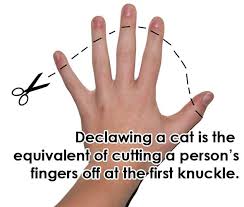 Declawing Might Become Criminal Animal Cruelty Offense
Declawing Might Become Criminal Animal Cruelty Offense
In 1952, the Journal of the American Veterinary Medical Association published a letter to the editor from a Chicago veterinarian who described a surgery his practice had been performing on cats: the removal of their front claws. That's how the declawing of cats began; a surgery that was dreamed up in one clinic and ended up being adopted by vets across country. Still, more than six decades after that letter was published, many cat owners continue to have their pets declawed. Critics of the surgery say it amounts to a painful amputation that can lead to behavior problems in cats, while supporters of declawing say it prevents some owners from euthanizing scratch-happy cats. About twenty countries, mostly in Europe, have banned declawing cats, as have San Francisco, Los Angeles and six other California cities. Many veterinarians around the country also refuse to perform the surgery. Now the debate has reached the statewide level in New Jersey, where the General Assembly has approved a bill that would add declawing to the list of criminal animal cruelty offenses. The measure, if passed by the state senate, would make New Jersey the first to impose a statewide declawing ban; New York is considering a similar law. A veterinarian who is the founder of the Paw Project, which campaigns against declawing says, "It's an amputation at the last bone of every one of your cat's toes. And is one of the most painful routinely-performed surgeries in all of veterinary medicine." The group also educates about the domino effect of declawing, where after the surgery cats can develop difficulty moving around and often stop using the litter box due to pain trying to dig in the litter, which makes owners unhappy. In addition, a declawed cat cannot scratch to defend itself and may begin biting. All that can lead to cats being surrendered to shelters. How often is declawing done? The New Jersey Veterinary Medical Association surveyed its 470 member practices and found that the veterinarians in the state perform an average of nine declaw procedures each year (4,230). The group's executive director calls some opponents of the bill ‘animal rights activists,' saying, "Some view animals essentially not as animals but as small people in furry coats."
 A Different Type of Rescue Organization
A Different Type of Rescue Organization
Jerry Myers of Southern California has rescued nearly 3,000 koi from ponds around San Diego County over the past three years. He went from one in-ground pond at his ranch for his own 30 fish to a peak of 14 ponds. His electric bill soared from $300 to $1,100 a month. Eventually he installed solar panels to cut his power bills, started a nonprofit to accept public donations and found a company that donates up to 100 pounds of feed pellets every month. Myers states there are many reasons people give up their koi. The fish can live up to 100 years and outlive their owners; the cost for electricity and water bills may become too expensive; or the fish may spawn and overwhelm the pond with babies. But, the most common reason is the fish can grow from three inches to a foot long in just a year and people either buy too many starter fish or their pond isn't big enough to accommodate the adults. Myers now has about 300 fish in six ponds on his property. His new rule is to arrange a new adoptive home for rescued koi before he ever collects them, so they don't have to endure the trauma of being moved twice. Visit his website.
Transfer of Resistant Bacteria Between People and Pets
Two researchers at a Canadian veterinary college in Ontario are set to embark on three years of studying drug-resistant bacteria in hopes of improving global health with collaborators in the U.K., Portugal, Germany and France. One of their projects will focus on the transfer of resistant bacteria between people and their pets and will involve a few hundred pet dogs. They explain it like this, "You have an animal that has an infection, we treat it with an antibiotic." But, what are the chances that resistance emerges in that animal, and then what are the chances that the actual resistance then gets passed on to people?"
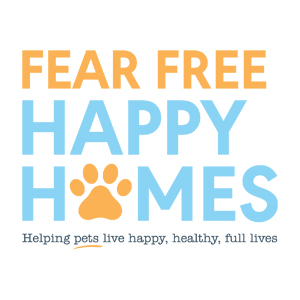
NEWS UPDATE brought to you by Fear Free. "Take the 'pet' out of 'petrified'" and get pets back for veterinary visits by promoting considerate approach and gentle control techniques used in calming environments.
 Listen to the entire Podcast of this show (#904)
Listen to the entire Podcast of this show (#904)



 The incredibly talented and charismatic John Salley was the first NBA player to win four championships with three different franchises, Detroit, Miami and the LA Lakers. But did you know he's also a Vegan and has an affinity for kittens? He'll be co-hosting Hallmark Channel's 'Meow Madness' Kitten Basketball Championship. John is our special guest this week. Find out what it's like to be a top athlete and abstain from all meat and dairy.
The incredibly talented and charismatic John Salley was the first NBA player to win four championships with three different franchises, Detroit, Miami and the LA Lakers. But did you know he's also a Vegan and has an affinity for kittens? He'll be co-hosting Hallmark Channel's 'Meow Madness' Kitten Basketball Championship. John is our special guest this week. Find out what it's like to be a top athlete and abstain from all meat and dairy. John will be the co-announcer of the first ever "Meow Madness' Kitten Basketball Championship on the Hallmark Channel along with Peabody Award-winning sportscaster Mary Carillo, giving you a chance to win $10,000.
John will be the co-announcer of the first ever "Meow Madness' Kitten Basketball Championship on the Hallmark Channel along with Peabody Award-winning sportscaster Mary Carillo, giving you a chance to win $10,000. Dr. Marty Becker is doing research on smells your cat likes. It's all in the name of science. He wants your pet's environment to be "
Dr. Marty Becker is doing research on smells your cat likes. It's all in the name of science. He wants your pet's environment to be " This means that you cat can smell things that you can't, and if you can smell something, it is a lot stronger for your cat.
This means that you cat can smell things that you can't, and if you can smell something, it is a lot stronger for your cat. Dangerous pet poisons can be found in any home on a daily basis. We here at Animal Radio try to share knowledge and care whenever we can. So, take a minute or three to identify if these items are in your home and if they are out of the reach of your beloved pets. If not, take some time today and get them put away safely.
Dangerous pet poisons can be found in any home on a daily basis. We here at Animal Radio try to share knowledge and care whenever we can. So, take a minute or three to identify if these items are in your home and if they are out of the reach of your beloved pets. If not, take some time today and get them put away safely.
 Next up - Household Cleaners. Just because it says all natural or green does not mean it is safe for your pets. If you are looking at the label for guidance, then you need to make sure it says "Pet Safe." There is a big difference between natural and environmentally safe and being pet safe. Your dogs and cats, if they encounter the areas that you are cleaning, can get the chemicals on their feet or other parts and when self-grooming they can ingest these chemicals, which can severely harm them.
Next up - Household Cleaners. Just because it says all natural or green does not mean it is safe for your pets. If you are looking at the label for guidance, then you need to make sure it says "Pet Safe." There is a big difference between natural and environmentally safe and being pet safe. Your dogs and cats, if they encounter the areas that you are cleaning, can get the chemicals on their feet or other parts and when self-grooming they can ingest these chemicals, which can severely harm them.
 One more very common pet poison potential is from foods and alcohol that we enjoy and they can get access. Alcohol is universally dangerous for our pets. Make sure you are not leaving this out where your pets can reach it. They do not know what it is and the unique smells may make it all that much more enticing to them. The same holds true for foods, things like onions, candy, gum, grapes and raisins can have severe consequences for your pets, so make sure that after you've enjoyed them, there aren't any left-overs where your curious pet can get into them.
One more very common pet poison potential is from foods and alcohol that we enjoy and they can get access. Alcohol is universally dangerous for our pets. Make sure you are not leaving this out where your pets can reach it. They do not know what it is and the unique smells may make it all that much more enticing to them. The same holds true for foods, things like onions, candy, gum, grapes and raisins can have severe consequences for your pets, so make sure that after you've enjoyed them, there aren't any left-overs where your curious pet can get into them.
 Pet lovers beware of the disturbing criminal trend called "pet flipping." This is when a person steals a pet or takes ownership of a lost pet, and then sells the animal. Pets are typically sold on the Internet to make a quick profit. The American Kennel Club (AKC) reports a rise in pet thefts.
Pet lovers beware of the disturbing criminal trend called "pet flipping." This is when a person steals a pet or takes ownership of a lost pet, and then sells the animal. Pets are typically sold on the Internet to make a quick profit. The American Kennel Club (AKC) reports a rise in pet thefts. 3. Use GPS Collars
3. Use GPS Collars
 Animal Abusers Barred From Owning Pets in RI
Animal Abusers Barred From Owning Pets in RI
 Firefighter Finds Lost Blind Dog
Firefighter Finds Lost Blind Dog
 Declawing Might Become Criminal Animal Cruelty Offense
Declawing Might Become Criminal Animal Cruelty Offense
